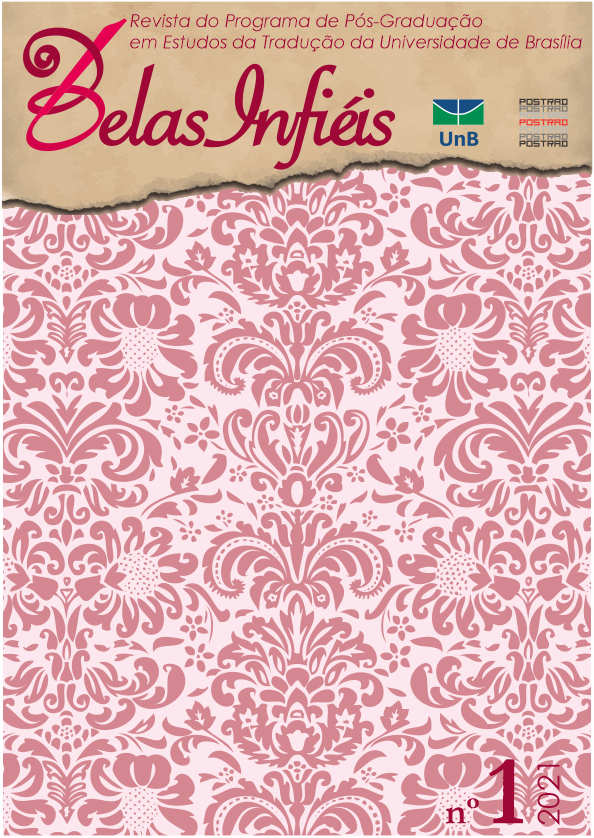Reflexiones en el entorno de la traducción audiovisual: entrevista a Claudia Moreno
DOI :
https://doi.org/10.26512/belasinfieis.v10.n1.2021.35517Mots-clés :
Traducción Audiovisual. CEEMO. Claudia Moreno. Entrevista.Résumé
Interesadas en debatir cuestiones vinculadas a la traducción audiovisual (TAV), un campo que a veces se ignora en el universo académico, pero que atrae a los aficionados por este arte y que acciona cada vez más a los profesionales, socializamos esta entrevista con la traductora mexicana Claudia Moreno, por su expresiva experiencia en dicho universo. El primer contacto con la entrevistada surge de la experiencia posdoctoral de una de las autoras de esta publicación ”” Profa. Dra. Leandra Cristina de Oliveira ”” en un país de importancia reconocida en la industria de la TAV hispánica: México. Con la indicación del Prof. Dr. Erik Daniel Franco Trujillo, del Centro de Estudios Lingüísticos y Literarios de El Colegio de México (CELL/COLMEX), donde se realizaba la estancia académica, entrevistamos a Claudia Moreno y platicamos ”” como dicen los mexicanos ”” sobre temas diversos, tales como: su trayectoria profesional, sus experiencias en proyectos de distintas lenguas-culturas, la relación entre las teorías y la práctica en Traducción, la industria, los conflictos, retos y decisiones lingüísticas, entre otros. El tiempo que a nosotras dedicó la profesional va plasmado en el texto a continuación.
Â
Téléchargements
Références
Franco, E., & Araújo, V. L. (2015). Entrevista com Jorge Diaz Cintas. Revista Cadernos de Tradução, 2(6), 311-323. https://periodicos.ufsc.br/index.php/traducao/article/view/6757
Gesser, A. F. (2018). Funcionalidades do pretérito perfeito espanhol em traduções para dublagem: análise de corpus fílmico [Dissertação de Mestrado, Universidade Federal de Santa Catarina]. http://www.bu.ufsc.br/teses/PLLG0725-D.pdf
Hurtado Albir, A. (2017). Traducción y traductología: introducción a la traductología. Cátedra.
Nájar, S. (2007). El doblaje de voz: orígenes, personajes y empresas en México. Salvador Nájar. http://www.salvadornajar.com/
Oliveira, L. C. de, Tavora, B., & Sobottka, M. A. W. S. (2020, julho). La negociación en la oralidad fingida: un estudio sobre las formas de tratamiento en la representación artística del Siglo de Oro. Gragoatá, Niterói, 25(Comemorativo), 268-290, julho 2020. https://periodicos.uff.br/gragoata/article/view/34203
Oliveira, L. C. de, & Gesser, A. F. (2015). La expresión temporal de pasado en el material de audio de una película brasileña traducida en México. Verbum Et Lingua, (5), 39-56. http://verbumetlingua.cucsh.udg.mx/articulo/la_expresion_temporal_de_pasado_en_el_material_de_audio_de_una_pelicula_brasilena_traducida
Orrego, D. C. (2013). Avance de la traducción audiovisual: desde los inicios hasta la era digital. Mutatis Mutandis, 6(2), 297-320. https://dialnet.unirioja.es/servlet/articulo?codigo=5012656
Pereira, L. L. O., & Oliveira, L. C. de. (2018). As formas de tratamento nominais e pronominais em Lope (2010): temporalidade linguística e verossimilhança. Letra Magna, 14(23), 451-472. http://www.letramagna.com/artigos_23/artigo29_23.pdf
Téléchargements
Publié-e
Comment citer
Numéro
Rubrique
Licence
(c) Tous droits réservés CC BY 2021

Cette œuvre est sous licence Creative Commons Attribution 4.0 International.
Copyright Statement
Given the public access to this journal, the texts are free to use but requires the recognition of the original authorship and initial publication in this journal to be properly stated.
The journal allows the use of works published for non-commercial purposes, including the right to submit the work to publicly accessible databases. Published contributions are the sole and exclusive responsibility of the author(s).
- When submitting papers to be evaluated by the Belas Infiéis journal, the author(s):
- Declare that the contents of the contributions are original and of their original creation, being entirely responsible for their content if there is an objection by third parties.
- Claim to be aware that they should not commit academic plagiarism.
- Declare that the manuscript has not been published, completely or partially, in Portuguese or another language. If it is a translation it should be submitted to the Translated Articles section.
- Declare that the manuscript is not being evaluated by other journals.
- Declare that the manuscript was not submitted to another journal simultaneously.
- Commit(s) to inform the journal of any kind of error or inaccuracy in their contribution (published, in evaluation or in editing) and to collaborate with the editors to make due corrections of the article (when in evaluation or editing) or erratum/retraction (after publication).
- Declare that there is no conflict of interest regarding the published work.
- Authorize its release if it is accepted for publication without any kind of monetary compensation.
- Agree to assign non-exclusive rights to publication to the magazine, remaining free to make their contribution available in other media as long as the publication of the first version in Belas Infiéis magazine is mentioned. They also authorize Belas Infiéis to assign their texts for reproduction in content indexers, virtual libraries and similar platforms.
- Maintain copyright and grant the journal the right of first publication, the work being licensed under theCreative Commons Attribution License.
- Is/Are allowed and encouraged to publish and distribute their work online after the editorial process, which may increase the impact and citation of the published work.
- Authorize the editorial team to make textual adjustments and to adapt the article to the publication rules, when necessary.



















